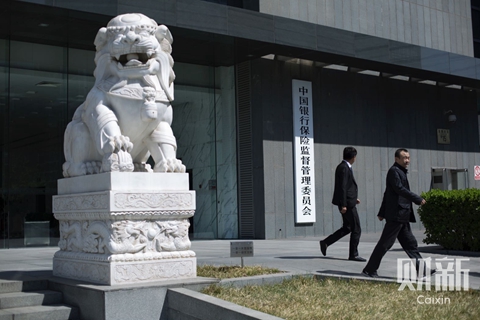China Fights ‘Gang Crime’ and ‘Evil’ in Illegal Lending

China’s top banking regulator is launching a special campaign to “sweep gang crime and eliminate evil” in the financial sector, targeting illegal lending and debt collecting.
The China Banking and Insurance Regulatory Commission (CBIRC) issued a notice Tuesday asking local regulators to work with police departments on crackdown on gangster-like activities by illegal loan providers.
The move intensifies a fight against abusive lending practices that often target students and young people. Caixin has learned that some lending platforms hired HIV carriers to threaten debtors. Others demanded nude photos from female borrowers as collateral with the threat of posting them online or sending them to families to ensure repayment.
Regulators have already imposed tough, new regulations on the thriving online peer-to-peer (P2P) and microlending sector, which has raised concerns about financial risks.
The new campaign targets activities including illegal public fundraising for private loans; collecting debt by illegal means such as detention, intimidation, threats and harassment; using funds from financial institutions to make high-rate loans; illegal lending to students; and insurance fraud.
The CBIRC also banned gang-related people from holding stakes in banks and insurers or positions in their managements and boards.
A special working group was established at the CBIRC to lead the sweeping campaign, led by CBIRC Vice Chairman Cao Yu.
Starting in September, large banks and insurance companies and local police each month will be required to report to the working group cases involving gang crime and wrongful activities as well as progress on enforcement campaigns. Major cases should be reported promptly, according to the notice.
In China, many online P2P and microlending platforms target low-income young borrowers, including students. Some such platforms have outsourced debt collection to third parties, which often use harassing and threatening practices or even violence to demand payment.
In one case last year, a 21-year-old college student who was saddled with mounting debt and harassed by collectors jumped off a hotel’s eighth floor to his death.
Such incidents involving indebted students spurred public outrage and prompted regulators to ban online lending platforms from targeting students last June.

- 1Cover Story: China Carves Out a Narrow Path for Offshore Asset Tokenization
- 2Drownings Shake Chinese Enthusiasm for Travel to Russia
- 3China Business Uncovered Podcast: A $15 Billion Bitcoin Seizure and the Fall of a Cybercrime Kingpin
- 4Over Half of China’s Provinces Cut Revenue Targets
- 5Li Ka-Shing’s Port Empire Hit by Forced Takeover Amid Panama Legal Dispute
- 1Power To The People: Pintec Serves A Booming Consumer Class
- 2Largest hotel group in Europe accepts UnionPay
- 3UnionPay mobile QuickPass debuts in Hong Kong
- 4UnionPay International launches premium catering privilege U Dining Collection
- 5UnionPay International’s U Plan has covered over 1600 stores overseas






